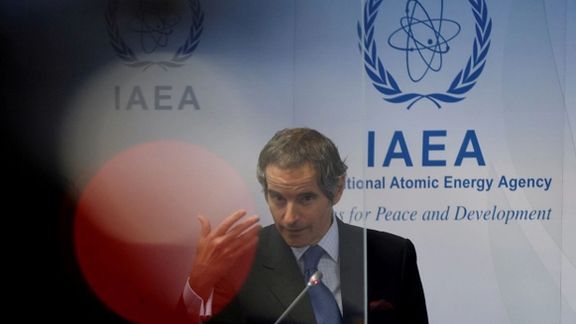Iran Demands Its Past Nuclear Work Be Taken Out Of IAEA Agenda

With the Vienna nuclear talks spilling into March, Tehran’s search for ‘guarantees’ and for ending probes into past nuclear work appear to be sticking points.

With the Vienna nuclear talks spilling into March, Tehran’s search for ‘guarantees’ and for ending probes into past nuclear work appear to be sticking points.
Sources close to the negotiations have told Iran International that Tehran has demanded western powers ask the International Atomic Energy Agency (IAEA) to drop its requests for information on uranium traces dating to before 2003 in several undeclared Iranian nuclear sites. Analysts have suggested the traces may relate to equipment supplied by the network of Pakistani scientist AQ Khan.
The United States and the three western European countries in the Vienna talks – France, Germany, and the United Kingdom – have argued that they should not ‘interfere’ in any IAEA investigation. Apparently confirming the Iranian demand, the lead British negotiator Stephanie Al-Qaq wrote on Twitter: “Safeguards are a fundamental part of the non-proliferation system and are separate. We will always reject any attempt to compromise IAEA independence.”
Iran has long argued that the IAEA should drop its repeated questioning over Tehran’s past nuclear work, but it is only in recent days that the issue has emerged as a contentious part of the Vienna talks aimed at reviving the 2015 nuclear deal, the JCPOA (Joint Comprehensive Plan of Action).
Rafael Mariano Grossi, the IAEA chief, told reporters Wednesday that such outstanding issues needed clarification regardless of “any other external process,” presumably meaning that he wanted answers over the pre-2003 work regardless of what happened with the JCPOA. But Iran’s view that Grossi’s pursuit of the issue is ‘politicized’ might have encouraged it to raise the matter in Vienna.
Western frustrations
Although restoring the JCPOA would extend IAEA inspections and monitoring of the Iranian nuclear program, the western European powers are showing frustration at the last stages of the Vienna talks.
In Israel Wednesday German Chancellor Olaf Scholz said agreement on reviving the JCPOA "cannot be postponed any longer…Now is the time to make a decision…Now is the time to finally say yes to something that represents a good and reasonable solution."
As Iran International reported Saturday, Iran is also still dissatisfied at proposals to ease United States sanctions in return for Tehran returning its nuclear program to JCPOA limits. Iran’s search for ‘guarantees’ that the US would not once again leave the JCPOA, as it did in 2018, has of late been cited less than disagreements over which US sanctions are incompatible with the 2015 deal.
‘Economic guarantees’
Ahmad Ali-Beighi (Ali-Baygi), a member of parliament, Sunday cited parliament speaker Mohammad-Bagher Ghalibaf (Qalibaf) that “economic guarantees” were part of Iran’s demands. Iran International has also quoted sources close to the Vienna talks that Tehran is seeking the delisting of the Revolutionary Guards (IRGC) by the US, given their economic role, and the removal of the 2019 US presidential executive order allowing the administration to sanction anyone linked to the office of Supreme Leader Ali Khamenei – an order used to sanction then foreign minister Mohammad Javad Zarif and then judiciary chief and now president, Ebrahim Raisi (Raeesi).
Ali Shamkhani, Iran’s top security official, said Monday that “bitter experience” with America had left Tehran with no choice but to seek “guarantees and a balanced agreement.” Mohammad Morandi, advisor to Iranian negotiators in Vienna, told Press TV Tuesday that Iran “can’t be pushed into a bad deal or an incomplete deal or a problematic deal.”